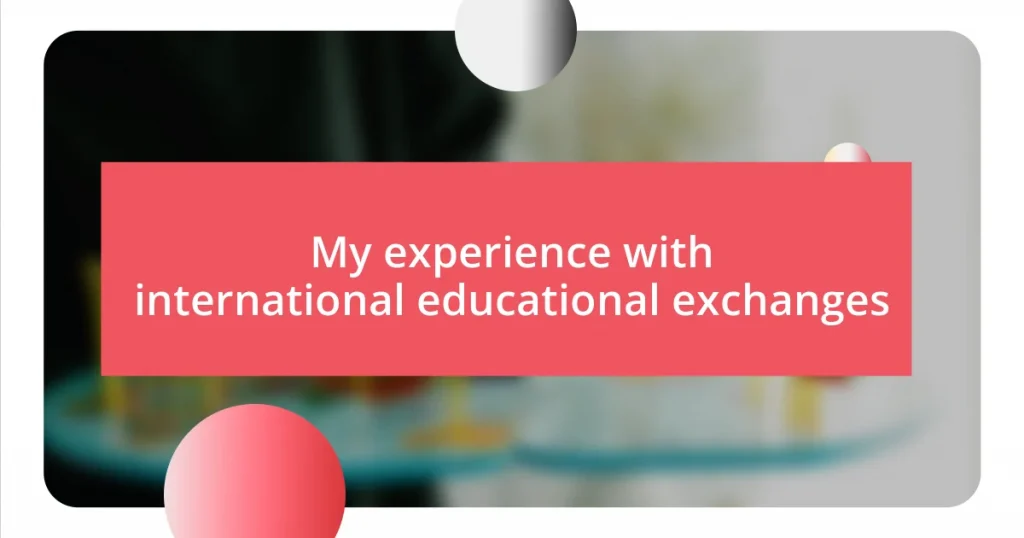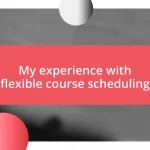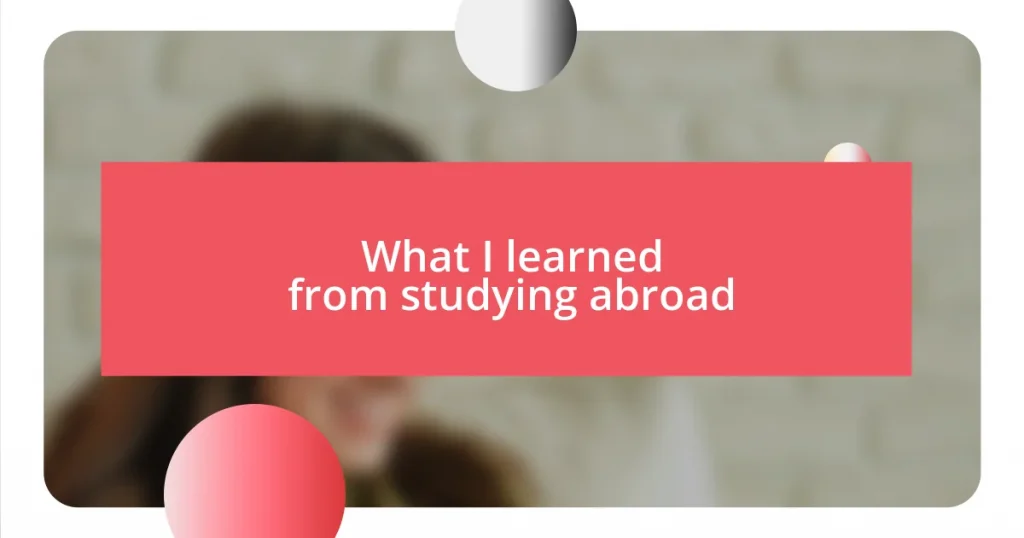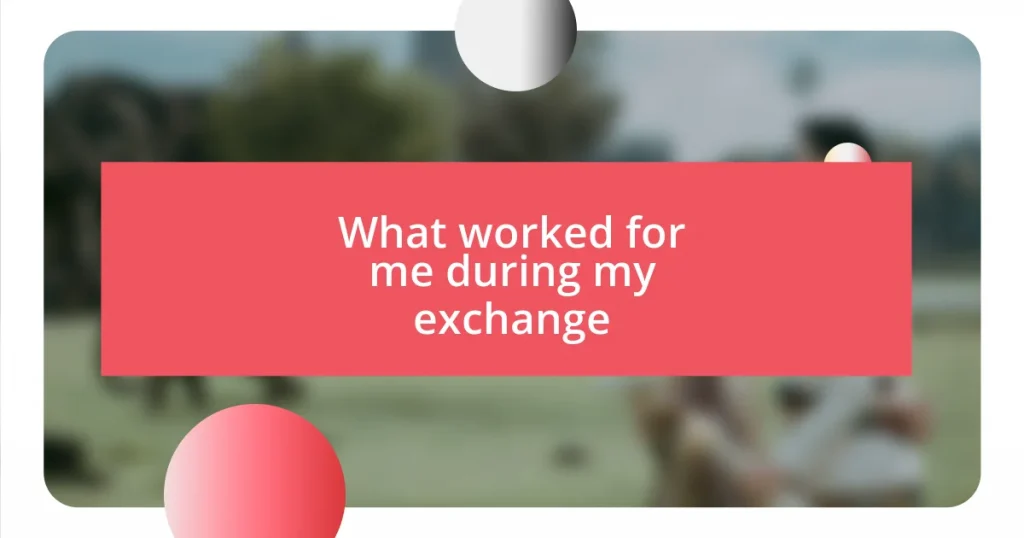Key takeaways:
- International educational exchanges foster intercultural competence, personal growth, and lifelong connections through immersive experiences.
- Choosing the right program is crucial, considering factors like academic fit, cultural immersion, and support services to enhance the exchange experience.
- Reflecting on the journey is essential for growth, enabling individuals to process emotions, acknowledge challenges, and appreciate their transformative experiences.
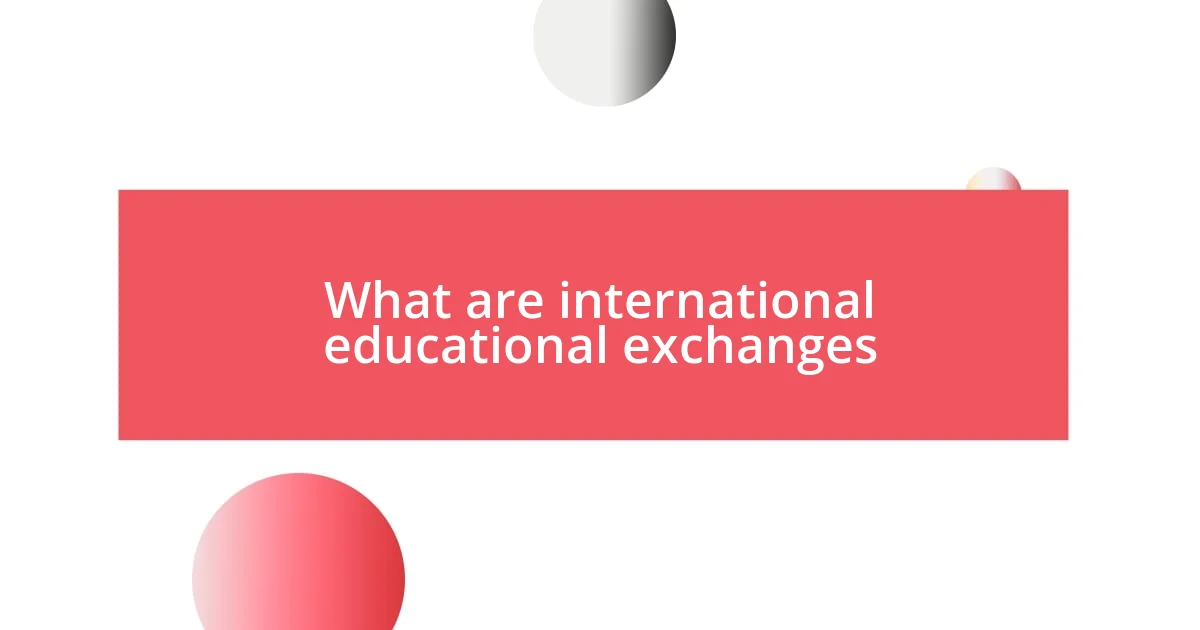
What are international educational exchanges
International educational exchanges are programs that allow students to study in a foreign country, immersing themselves in a new culture while pursuing their academic goals. When I participated in such an exchange, I vividly remember the thrill of stepping into a classroom filled with students speaking a different language, their laughter echoing while I fumbled with my own words. It’s fascinating to think about how these experiences can shape not only our education but also our worldview.
These exchanges are about more than just academics; they serve as bridges connecting diverse cultures and perspectives. Have you ever wondered how it feels to live with a host family who celebrates holidays you’ve never heard of? I still cherish the warmth of my host family’s Christmas celebration, filled with traditions that enriched my understanding of community and belonging. It’s moments like these that help us realize how interconnected we all are, transcending borders and backgrounds.
Essentially, international educational exchanges are designed to promote global understanding and empathy among students. They challenge us to step outside our comfort zones and embrace the unknown, creating lasting friendships and unforgettable memories. I often reminisce about late-night conversations with friends from different countries, discussing our dreams and fears. Those moments felt transformative and truly highlighted the beauty of exchange – it’s not just about learning in a classroom, but also about learning from each other’s lives.
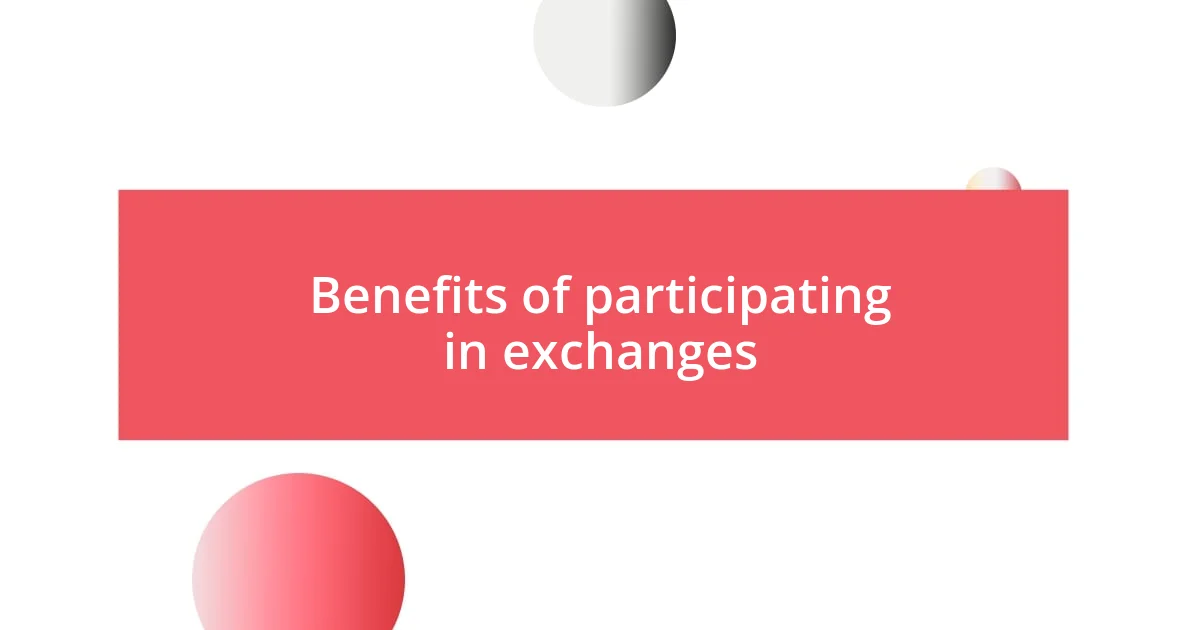
Benefits of participating in exchanges
Participating in international educational exchanges offers profound benefits that extend far beyond the classroom. One of the most significant advantages is the development of intercultural competence. I remember my first meal with my host family, where I was introduced to traditional dishes I’d never seen before. Not only did I get to taste incredible flavors, but I also learned the importance of food in their culture—how it brings people together and fosters connections. This hand-on experience greatly broadened my perspective on the world around me.
Another key benefit is the opportunity for personal growth. Living in a different country forces you to navigate unfamiliar situations and think critically. I once got lost in a city bustling with activity, and instead of panicking, I learned to rely on my problem-solving skills and the kindness of strangers. This experience taught me resilience and adaptability, qualities that I carry with me to this day. The struggles I faced during my exchange became stepping stones to a stronger and more confident version of myself.
Building an international network is another rewarding aspect of these exchanges. The friendships I formed with fellow students from all over the globe transformed my life in unexpected ways. I still keep in touch with a friend from Brazil, and we recently collaborated on a project remotely. It’s incredible to think how our lives have woven together, and these connections can lead to future professional opportunities. Isn’t it amazing how a single experience can create a tapestry of relationships that span continents?
| Benefit | Description |
|---|---|
| Intercultural competence | Deepens understanding and appreciation of different cultures through immersive experiences. |
| Personal growth | Encourages resilience and adaptability by navigating unfamiliar situations. |
| Networking | Builds lasting friendships and professional connections across the globe. |
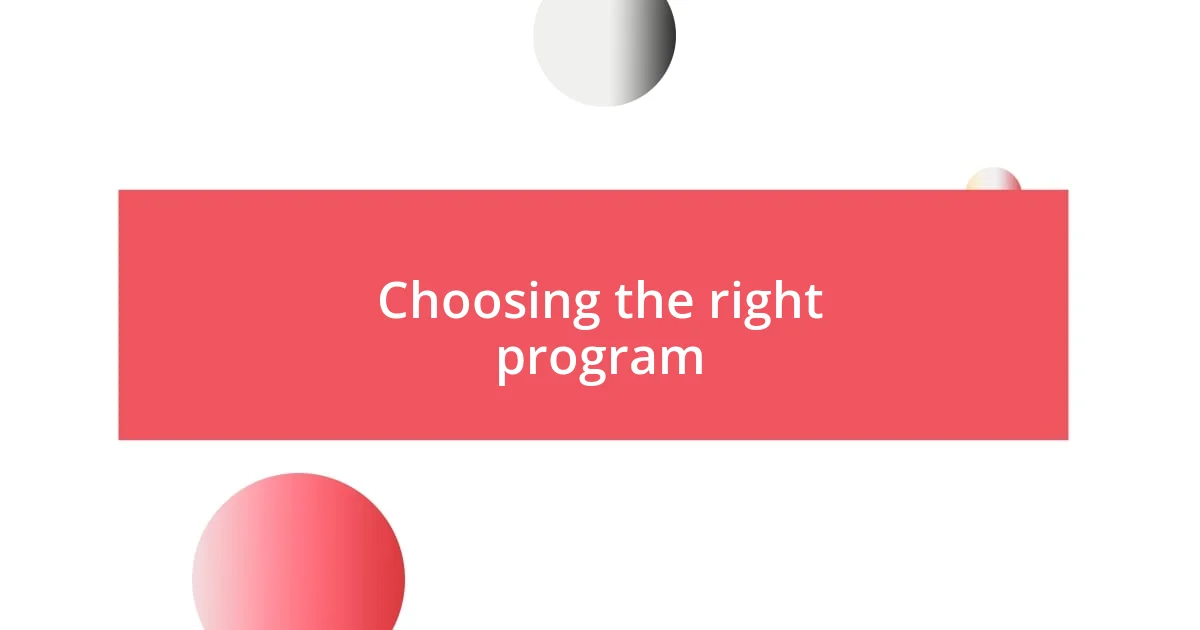
Choosing the right program
Choosing the right program can feel overwhelming, but I believe it’s one of the most critical steps in making your exchange experience fulfilling. During my search, I looked for programs that matched my academic goals while also offering a chance to delve into a culture that fascinated me. I still recall feeling that rush of excitement when I found a program that combined both my major and my love for exploring new traditions.
When I reviewed different programs, I sought a blend of factors that spoke to me personally. Here’s what I considered important:
- Academic Fit: Ensure the program aligns with your educational goals, offering courses or opportunities that interest you.
- Cultural Immersion: Look for programs that emphasize real-life experiences, like living with local families or participating in community events.
- Support Services: Assess the availability of resources like counseling, language assistance, and guidance from program staff.
- Location: Choose a city or region that excites you—familiar environments can ease the transition, while new settings can push you out of your comfort zone.
- Peer Community: Seek programs with a supportive group of fellow participants, as these relationships can make a world of difference during your exchange.
Reflecting on my experience, the right choice made all the difference, transforming my journey into one that was not just educational but transformative.
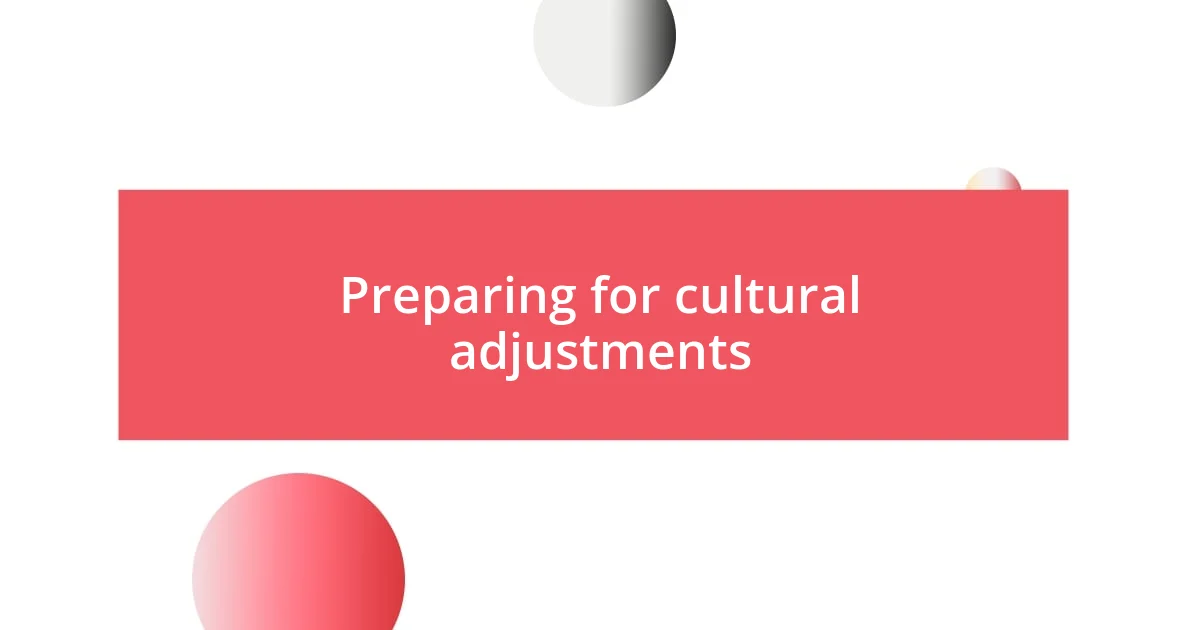
Preparing for cultural adjustments
Cultural adjustments can be both exciting and intimidating, and preparing for this transition is crucial. When I first arrived in my host country, I felt like a fish out of water, surrounded by unfamiliar customs and social norms. I vividly remember my first encounter with local greetings; it felt so strange to kiss cheeks instead of a simple handshake. Gradually, I began to understand the nuances of their interactions, and it helped me connect on a deeper level with those around me.
As I navigated this new culture, I found that embracing the differences rather than resisting them made a huge difference. For example, I discovered that humor relied heavily on context and shared experiences. One day, I misinterpreted a local joke and ended up being the punchline. Instead of feeling embarrassed, I chose to laugh along and learn from the situation. Have you ever faced a similar moment? These experiences, though awkward, shaped my understanding and appreciation of the culture in profound ways.
To ease the cultural transition, I built a habit of actively learning about the local customs before I even set foot in the country. I watched documentaries, read articles, and even practiced the language. When I finally arrived, I felt more equipped to engage respectfully in conversations and community events. These small steps helped me gain confidence and allowed me to truly immerse myself in the experience. Preparation transformed potential culture shock into exciting opportunities for discovery!
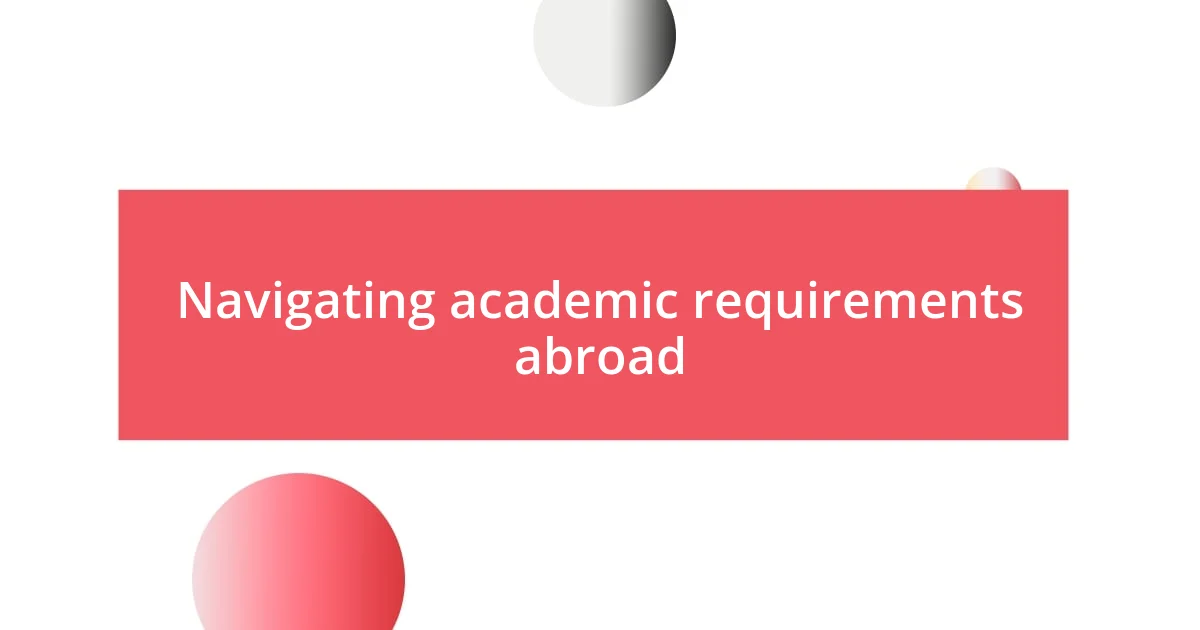
Navigating academic requirements abroad
When it came to navigating academic requirements abroad, I found myself in a bit of a maze. Each institution had its own set of prerequisites, from course credits to language proficiency tests. I remember sitting at my desk, surrounded by a sea of paperwork that felt overwhelming. The feeling of doubt crept in—would I be able to meet these demands? However, I quickly learned that my own institution often had several resources available, such as academic advisors who were eager to help. I recommend reaching out to them. They can clarify requirements that seem confusing at first.
As I dived deeper into my research, I discovered the importance of understanding the grading systems in different countries. In my experience, I wasn’t just learning about the subject matter; I was also adapting to varied expectations. I recall a particularly challenging assignment where I faced severe penalties for not adhering to local citation styles. It felt discouraging at the time, but ultimately, it pushed me to refine my skills. Have you ever faced similar challenges? Embracing these moments fosters growth and resilience.
Building connections with fellow students proved invaluable, as they often served as a lifeline. I vividly remember my first group study session with local peers. They shared insights about navigating the system that I could have never anticipated. It was comforting to know that I wasn’t alone in this journey. Learning to ask for help, whether through study groups or academic workshops, transformed my academic experience from isolating to collaborative. If you’re ever unsure about filling out academic forms or meeting deadlines, don’t hesitate to seek guidance. The more you connect with others, the easier it becomes to navigate the academic landscape abroad.
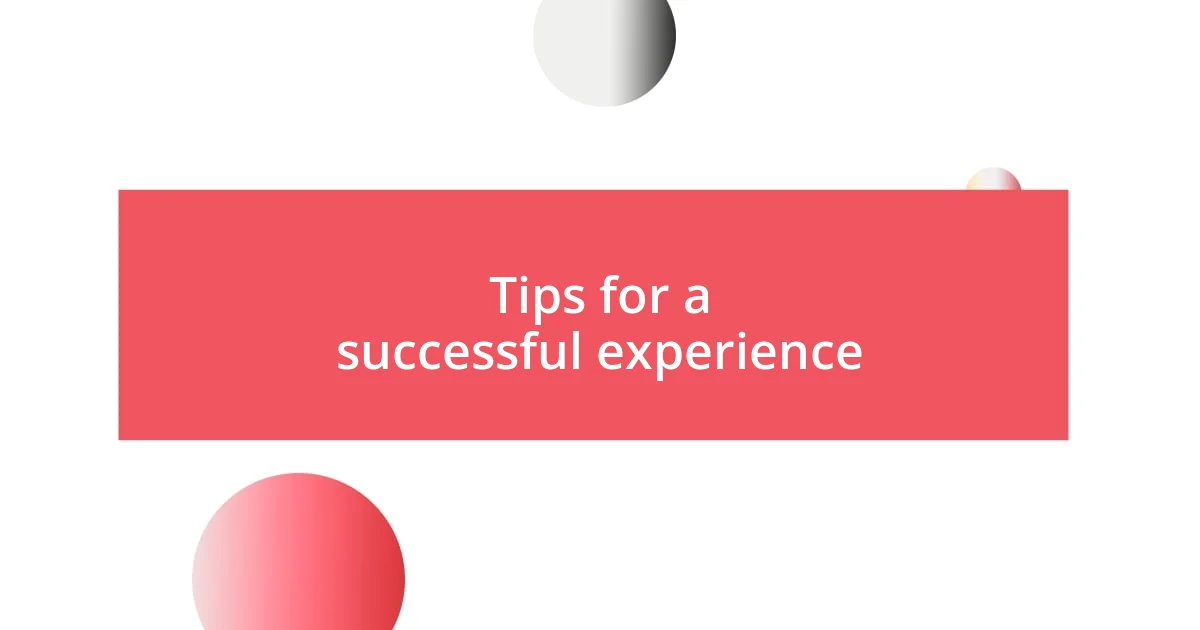
Tips for a successful experience
When I think about what made my experience successful, the first thing that comes to mind is staying open-minded. I remember walking into a local market for the first time—it was a sensory overload! The bustling noise, the vibrant colors, and the incredible aromas were almost too much to process. Instead of feeling overwhelmed, I took a deep breath and let curiosity guide me. I asked vendors about their products, tried new flavors, and even joined in on cooking tips. This willingness to embrace spontaneity led me to delightful surprises, like a hidden café serving the best pastries I’d ever tasted.
For anyone participating in an exchange program, fostering relationships is pivotal. Reflecting on my time abroad, I realize that many friendships shaped my journey. I recall a late-night conversation with a roommate from a different country, where we shared stories about our lives—her tales of festive family traditions expanded my world view. These connections turned into powerful support systems, especially during challenging moments. Have you ever met someone who changed your perspective on life? I believe that if you actively seek such relationships, you’ll enrich your experience manifold.
Lastly, self-reflection played a huge role in my success. I made it a habit to keep a journal throughout my stay. Writing about my daily experiences helped me process the whirlwind of emotions I encountered—everything from joy to homesickness. One rainy evening, as I poured my heart onto the pages, I realized how much I had grown. Documenting my journey provided clarity and insight, allowing me to identify patterns in my feelings and responses. If you haven’t tried this yet, I highly recommend it. What better way to capture your evolution and understand the impact of your experience than through your own words?
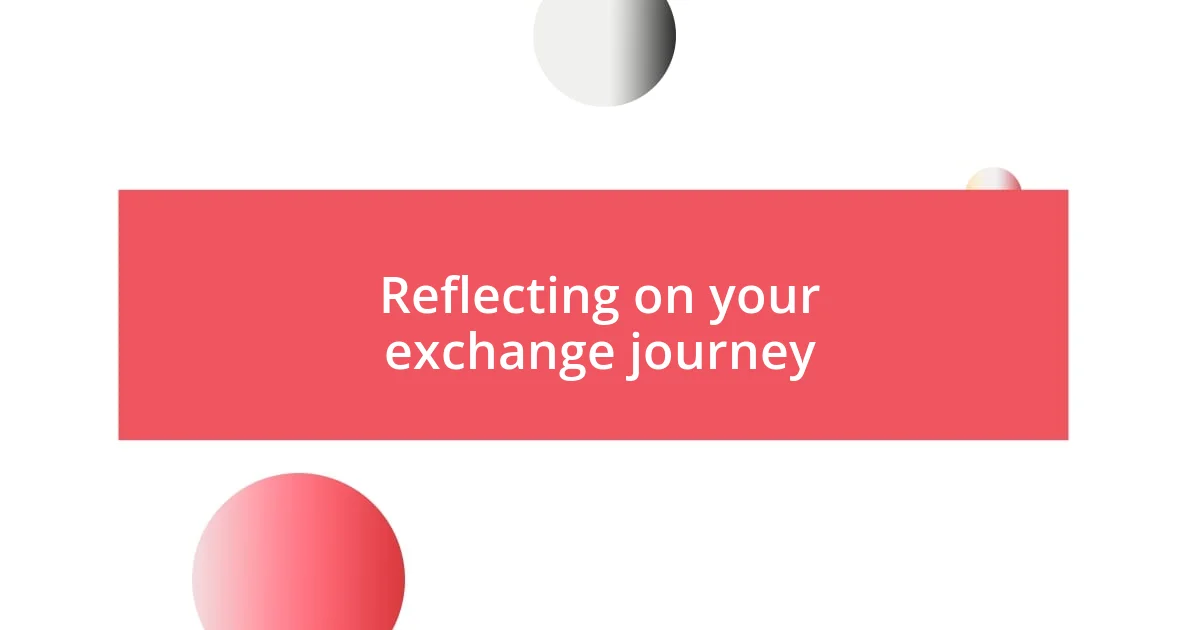
Reflecting on your exchange journey
Reflecting on my exchange journey often brings a rush of emotions. I distinctly remember one quiet afternoon spent on my balcony, sipping tea and watching the sunset. It hit me just how much I had adapted, not only to a new culture but to my own transformations. Have you ever paused to consider how much you’ve changed during a significant experience? Those moments of reflection allowed me to appreciate the vulnerability I felt and the strength I discovered within myself.
There were times when I wrestled with loneliness, especially during significant local holidays. I vividly recall spending New Year’s Eve alone in my room while my peers celebrated with their families. It was during one of those moments that I learned to embrace my feelings rather than shy away from them. Instead of wallowing, I reached out to friends online, and we shared our traditions and experiences. This taught me the importance of acknowledging loneliness while also finding comfort in connection, even if it comes from afar.
Navigating the ups and downs of my exchange experience ultimately required a blend of self-awareness and adaptability. I still keep a small box of mementos—photos, ticket stubs, and letters—each piece telling a story of growth and discovery. What about you? How do you capture meaningful moments? I believe that reflecting on our journeys helps solidify the lessons learned, creating a narrative that we can carry forward, enriching not just our memories but our lives as well.










